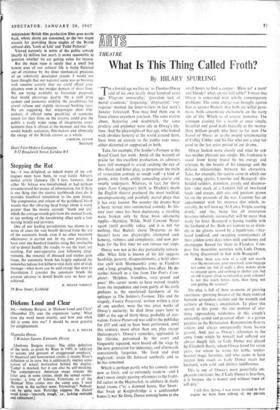Dickens Loud and Clear
SIR,—Anthony Burgess, in 'Dickens Loud and Clear' (December 23), uses the expression 'camp.' What does the word mean exactly, and how and when did it come into use? I should be most grateful for enlightenment.
D. C. P. PHELPS
Magnolia House, 2 Windsor Square, Exmouth, Devon
[Anthony Burgess writes: The older definition of the term, as given by Ware in 1909, is 'addicted to actions and gestures of exaggerated emphasis.' In theatrical and homosexual circles it retains Ware's definition at its core, but it additionally implies some notion of sexual motivation behind the display. 'Camp' is mocked, but it can also be self-mocking. The contemporary American usage stresses the latter and, in some circles, sheds the sexual conno- tations: a love of hideous Victoriana or of the 'Batman' films comes into the camp area. I used the term in the earliest sense. Etymology? Nobody can be quite sure. Partridge suggests the dialect word keinp—'uncouth, rough,' i.e.. lacking restraint and refinement.)


































 Previous page
Previous page